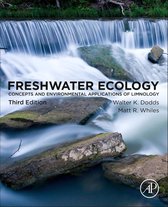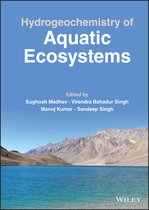Aquatic Environmental Bioengineering Monitoring and Remediation of Contamination
Afbeeldingen
Sla de afbeeldingen overArtikel vergelijken
Uitgever: John Wiley & Sons Inc
- Engels
- Hardcover
- 9781119760948
- 26 mei 2022
- 240 pagina's
Samenvatting
Discover the importance of remediation efforts for aquatic ecosystems
Most contamination of water bodies stem from human activity, and the pollution in our water is one of the most important environmental concerns facing future generations. The most significant of these pollutants are halogenated organic compounds, petroleum hydrocarbons, radionuclides, metal and metalloids, pharmaceutical drugs, microbial toxins, and flame retardants. With such a vast array of potential contaminants and dangerously cumulating contamination levels in fragile marine environments, reparative action is more essential than ever.
Aquatic Environmental Bioengineering: Monitoring and Remediation of Contamination provides the reader with a map towards environmentally safe and economically feasible technologies to intervene in polluted aquatic ecosystems. The authors suggest a phased approach consisting of site classification and risk assessment, followed by remediation technology selection and implementation. Effective methods for surveying bodies of water are particularly emphasized, and advancements in the development of novel transgenic plants and microbial fuel cells are put forward as effective tools against environmental contamination and industrial wastewater pollution.
Readers will also find:
- A focus on the most recent and cutting-edge research on the topic: photocatalysis, the use of genetically modified organisms, and the use of nanomaterials
- A simple compendium of fundamental concepts in environmental engineering of aquatic ecosystems
- A detailed discussion of the advancement in remote sensing and geographic information (GIS), methodologies that make it possible to conduct large-scale water remediation studies at reasonable cost
The ideal resource for researchers and students of environmental science, plant biotechnology, agricultural science, environmental engineering, and plant sciences, Aquatic Environmental Bioengineering will be a crucial resource for the remediation of contaminants in our aquatic ecosystems.
Aquatic Environmental Bioengineering
Discover the importance of remediation efforts for aquatic ecosystems
Most contamination of water bodies stem from human activity, and the pollution in our water is one of the most important environmental concerns facing future generations. The most significant of these pollutants are halogenated organic compounds, petroleum hydrocarbons, radionuclides, metal and metalloids, pharmaceutical drugs, microbial toxins, and flame retardants. With such a vast array of potential contaminants and dangerously cumulating contamination levels in fragile marine environments, reparative action is more essential than ever.
Aquatic Environmental Bioengineering: Monitoring and Remediation of Contamination provides the reader with a map towards environmentally safe and economically feasible technologies to intervene in polluted aquatic ecosystems. The authors suggest a phased approach consisting of site classification and risk assessment, followed by remediation technology selection and implementation. Effective methods for surveying bodies of water are particularly emphasized, and advancements in the development of novel transgenic plants and microbial fuel cells are put forward as effective tools against environmental contamination and industrial wastewater pollution.
Readers will also find:
- A focus on the most recent and cutting-edge research on the topic: photocatalysis, the use of genetically modified organisms, and the use of nanomaterials
- A simple compendium of fundamental concepts in environmental engineering of aquatic ecosystems
- A detailed discussion of the advancement in remote sensing and geographic information (GIS), methodologies that make it possible to conduct large-scale water remediation studies at reasonable cost
The ideal resource for researchers and students of environmental science, plant biotechnology, agricultural science, environmental engineering, and plant sciences, Aquatic Environmental Bioengineering will be a crucial resource for the remediation of contaminants in our aquatic ecosystems.
Productspecificaties
Inhoud
- Taal
- en
- Bindwijze
- Hardcover
- Oorspronkelijke releasedatum
- 26 mei 2022
- Aantal pagina's
- 240
Betrokkenen
- Hoofdauteur
- Rouf Ahmad Bhat
- Tweede Auteur
- Mohammad Yaseen Mir
- Hoofduitgeverij
- John Wiley & Sons Inc
Overige kenmerken
- Product breedte
- 170 mm
- Product hoogte
- 19 mm
- Product lengte
- 244 mm
- Studieboek
- Nee
- Verpakking breedte
- 170 mm
- Verpakking hoogte
- 19 mm
- Verpakking lengte
- 244 mm
- Verpakkingsgewicht
- 567 g
EAN
- EAN
- 9781119760948
Je vindt dit artikel in
- Categorieën
- Taal
- Engels
- Boek, ebook of luisterboek?
- Boek
- Beschikbaarheid
- Leverbaar
- Studieboek of algemeen
- Algemene boeken
Kies gewenste uitvoering
Prijsinformatie en bestellen
De prijs van dit product is 139 euro.- Prijs inclusief verzendkosten, verstuurd door bol
- Ophalen bij een bol afhaalpunt mogelijk
- 30 dagen bedenktijd en gratis retourneren
- Dag en nacht klantenservice
Rapporteer dit artikel
Je wilt melding doen van illegale inhoud over dit artikel:
- Ik wil melding doen als klant
- Ik wil melding doen als autoriteit of trusted flagger
- Ik wil melding doen als partner
- Ik wil melding doen als merkhouder
Geen klant, autoriteit, trusted flagger, merkhouder of partner? Gebruik dan onderstaande link om melding te doen.









